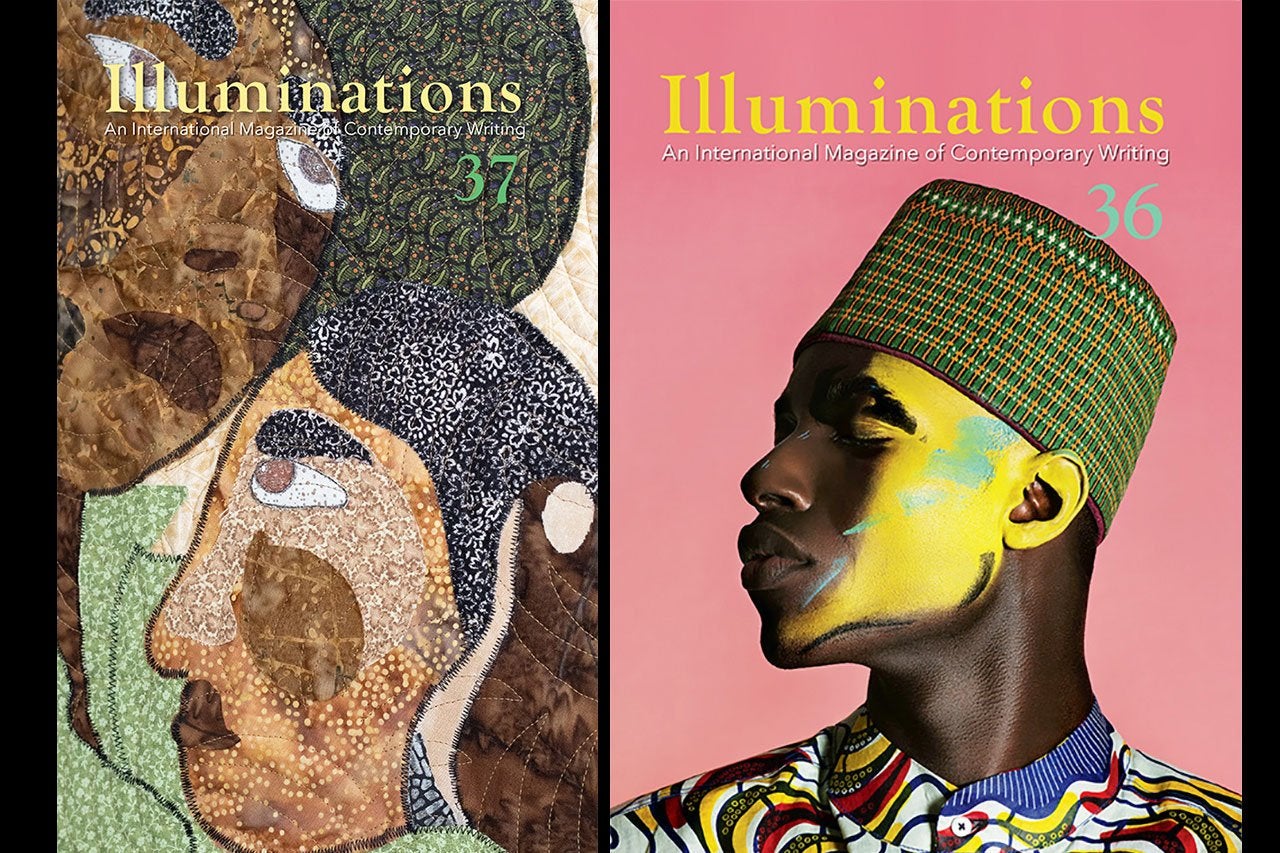If you mapped out the countries where the literary journal Illuminations has traveled, the route would go from England and the United States to Japan and Tanzania. Long-time editor Simon Lewis, professor of English and recipient of the 2021 Governor’s Award in the Humanities, found a permanent home for the journal at the College of Charleston in 1996. Since then, supported by the Department of English, the journal annually highlights the poetry, creative writing, interviews, translations and artwork of diverse artists.
“Our goal is to publish new writers alongside some of the world’s finest,” says Lewis. “Illuminations has a local and global connection and publishes emerging and established poets from across the globe.”
This year marks the 40th anniversary of Illuminations, (the 37th print issue) and includes selections from established writers like Paul Allen, a beloved poetry professor at CofC who retired after 30 years, and emerging writers like Michael Wiese, a prisoner of the Texas Department of Criminal Justice.
“The international focus of Illuminations brings a wide variety of voices and sensibilities to readers,” says Marjory Wentworth, poet and adjunct instructor of English at CofC. “This brilliant symphony of voices helps us all better understand the world – this is a great service to the CofC community and everyone who picks up a copy of this excellent publication.”
This year’s cover features work by local fiber artist Torreah “Cookie” Washington, who weaves stories of the African American experience into quilts to keep the tradition alive. Her quilt “My Ancestors’ Acres Stolen, Seeking Return” is a collaborative project with the Acres of Ancestry Initiative/Black Agrarian Fund, a nonprofit working to restore landownership to Black farmers who were robbed of their land. Lewis says he was drawn to this particular quilt because it taps into the broader story of racial discrimination in the U.S.
Inspired by the indifference Lewis has witnessed to global suffering in the last few years, the latest issue of the journal is dedicated to “the millions killed by COVID, to the people of Ukraine and to all those displaced by war and violence.”
“Poetry is an attentive art,” he says. “In the writing, it depends on the poets’ attention to what is going on, and in the reading, poetry ought to make its readers pay attention.”
Featuring poetry, fiction and nonfiction, the literary journal Crazyhorse has been with the College since 2001 when Bret Lott, author and professor of English, took over the reins from another university. Since then, it has earned the reputation of being one of the most influential literary journals published today. The final issue of Crazyhorse was published in the spring of 2022 and will be relaunched in 2023 under the new title, swamp pink.
“Literary journals not only bring prestige and name recognition to the department, they help create a culture of literary activity,” says Scott Peeples, professor and chair of the English department. “Students get a chance to see and hear writers who come to campus because of the journals and the literary culture they help create.”
At the College, former faculty member Paul Allen founded the award-winning undergraduate journal Miscellany in 1980 to give student-writers and student-editors a voice and the opportunity to hone their craft and learn about the publishing process.
The value of having a student literary publication is demonstrated by Patrick Wohlscheid ’22, the former co-editor of Miscellany, who published academic essays in several journals and presented work at four academic conferences. This fall he begins his graduate study in English at Johns Hopkins University.
The experiences and opportunities these journals present for students are invaluable, says Jammie Huynh, a student in the College’s Master of Fine Arts in Creative Writing Program.
“The most important aspect is the camaraderie and the relationships that are built in that space and environment,” says Huynh, who received the Free Verse Poetry Prize for her collection Out of Darkness. “We all have something to learn from one another and a creative writing program or literary journal is a perfect place to do so.”
Living for Literature
The faculty members of the Department of English play an essential role in the campus’s literary culture, which is evidenced by some of the books they’ve published in recent years. Books published by English department faculty since 2019 include:
Simon Lewis and Adam Domby: Freedoms Gained and Lost: Reconstruction and Its Meanings 150 Years Later (Fordham University Press, 2022)
Tim Carens: Strange Gods: Love and Idolatry in the Victorian Novel (Routledge, 2022)
Gary Jackson: origin story: poems (University of New Mexico Press, 2021)
Myra Seaman: Objects of Affection: The Book and the Household in Late Medieval England (Manchester University Press, 2021)
William Russell: Inventing the Critic in Renaissance England (University of Delaware Press, 2020)
Scott Peeples: The Man of the Crowd: Edgar Allan Poe and the City (Princeton University Press, 2020)
Kathleen Béres: Rogers, Scorpions in the Mind: The Romantic Construction of Obsession (Palgrave, 2019)
Anthony Varallo: The Lines (novel; University of Iowa Press, 2019)




